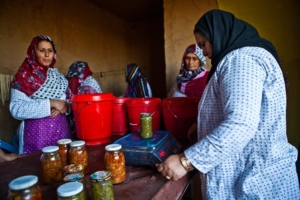UNDP Support Women in Afghanistan Working in Small Businesses
 The United Nations Development Programme (UNDP) supports international development sustainably and structurally, aiming to eradicate poverty and provide countries with knowledge and resources to foster development. The UNDP has focused its efforts on supporting women in Afghanistan through the current economic climate. The organization is supplying women with vocational skills and financial knowledge to boost female employment. Due to the Taliban Administration, the UNDP operates within areas where exceptions to the constraints on women apply or where locally informed solutions exist.
The United Nations Development Programme (UNDP) supports international development sustainably and structurally, aiming to eradicate poverty and provide countries with knowledge and resources to foster development. The UNDP has focused its efforts on supporting women in Afghanistan through the current economic climate. The organization is supplying women with vocational skills and financial knowledge to boost female employment. Due to the Taliban Administration, the UNDP operates within areas where exceptions to the constraints on women apply or where locally informed solutions exist.
The Situation in Afghanistan
Since August 2021 the Afghan economy has been in decline. In 2022, the number of households not having income to meet basic necessities rose from 16% to 36%. Policies under the Taliban Administration have had an especially limiting impact on women in Afghanistan, with restrictions imposed on education and employment.
In response to the situation, the UNDP adapted its programs to an integrated local development effort – Area-Based Approach to Development Emergency Initiatives (ABADEI). To prevent further economic breakdown, this program applies solutions at a community-based level. Grants are provided to small businesses, with a focus on supporting female-run organizations. Maintaining these local economies supports keeping structure and purpose within Afghan communities. The funds are supplied from U.N. contributions, in combination with the “Special Trust Fund for Afghanistan.” This fund coordinates support from UNDP agencies and non-government organizations.
Supporting Women in Afghanistan
In their support of female-owned businesses, UNDP aims to reboot the Afghan economy by supporting job creation and basic social services. Applying a “women for women” approach, it supplies the financial and technical support to women required to create employment. The UNDP supported 8,728 Micro, Small and Medium Enterprises through in-kind and cash support, 49.2% of these were female-led, according to its website.
An area whereby the ABADEI programme has successfully implemented its goal is expanding community kitchens. Partnered with Care Afghanistan, these kitchens feed families and provide a source of income for those who work there.
Tamana Akbari
As a single mother, before these kitchens, Tamana Akbari had no source of income. In joining she has developed new relationships aiding in growing her confidence and social skills. The benefits are not just social, Tamana now has also fostered new culinary skills and is earning a salary of her own. She now acts as the sole breadwinner for her family.
Across five provinces there are a total of 47 community kitchens, these kitchens have provided 153,000 hot meals, feeding over 86,870 people. Organizations like these, foster social cohesion whilst also providing empowerment for women like Tamana, who prepare the meals. Fifteen female-run kitchens have supplied food for thousands. In Herat, alongside three men, 147 women distributed 2,200 free meals a day.
Local communities have embraced this initiative, and supported by UNDP’s ABADEI program, women in Afghanistan are being inspired to start similar projects of their own.
– Amelia Short
Amelia is based in Bradford, UK and focuses on Good News for The Borgen Project.
Photo: Flickr
